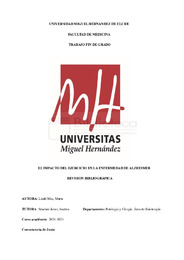Por favor, use este identificador para citar o enlazar este ítem:
https://hdl.handle.net/11000/37527Registro completo de metadatos
| Campo DC | Valor | Lengua/Idioma |
|---|---|---|
| dc.contributor.advisor | Sánchez Jover, Andrea | - |
| dc.contributor.author | Lledó Mas, Marta | - |
| dc.contributor.other | Departamentos de la UMH::Patología y Cirugía | es_ES |
| dc.date.accessioned | 2025-09-24T09:40:22Z | - |
| dc.date.available | 2025-09-24T09:40:22Z | - |
| dc.date.created | 2025-05-22 | - |
| dc.identifier.uri | https://hdl.handle.net/11000/37527 | - |
| dc.description.abstract | Introducción: La prevalencia de la enfermedad de Alzheimer va en aumento y la nula efectividad de los tratamientos farmacológicos suscita la búsqueda de alternativas. La fisioterapia, a través del ejercicio, es una opción para retrasar y/o disminuir la sintomatología y prevenir su aparición. Objetivos: Conocer qué efectos tiene la realización de actividad física en la enfermedad de Alzheimer, y qué tipo de ejercicio tiene mayor beneficio. Material y métodos: Se efectuó una consulta de fuentes bibliográficas a través de distintas bases de datos como Pubmed, PEDro y Science Direct, utilizando los operadores booleanos OR o AND para unir las palabras clave elegidas: “Alzheimer”, “therapeutic exercise”, “exercise”. Resultados: Nueve artículos fueron seleccionados a estudio, resultando todos ellos con efectos positivos para las personas que padecen Enfermedad de Alzheimer y sus cuidadores. Conclusión: Los beneficios de la aplicación de ejercicio en esta enfermedad son múltiples, produciendo mejoras en la calidad de vida, cognición, riesgo de caídas, memoria, etc. | es_ES |
| dc.description.abstract | Introduction: The prevalence of Alzheimer’s disease is increasing, and the lack of effectiveness of pharmacological treatments has led to the search of alterntative approaches. Physiotherapy, through exercise, is a potential option to delay or reduce symptoms, and prevent their onset. Objectives: know the effects of physical activity on Alzheimer’s disease and determine which type of exercise provides the greatest benefit. Material and methods: A consultation of bibliographic sources was carried out thought different databases such as PubMed, PEDro, and Science Direct. Boolean operators OR and AND were used to combine selected keywords: “Alzheimer”, “therapeutic exercise”, and “exercise”. Results: 9 articles were selected for review, all of wich showed positive effects for people with Alzheimer’s disease and their caregivers. Conclusions: The benefits of exercise in this disease are multiple, leading to improvements in quality of life, cognition, risk of falls memory failures and more. | es_ES |
| dc.format | application/pdf | es_ES |
| dc.format.extent | 26 | es_ES |
| dc.language.iso | spa | es_ES |
| dc.publisher | Universidad Miguel Hernández | es_ES |
| dc.rights | info:eu-repo/semantics/openAccess | es_ES |
| dc.rights | Attribution-NonCommercial-NoDerivatives 4.0 Internacional | * |
| dc.rights.uri | http://creativecommons.org/licenses/by-nc-nd/4.0/ | * |
| dc.subject | Exercise | es_ES |
| dc.subject | therapeutic exercise | es_ES |
| dc.subject | Alzheimer | es_ES |
| dc.subject.other | CDU::6 - Ciencias aplicadas | es_ES |
| dc.title | El impacto del ejercicio en la enfermedad de alzheimer. Revisión bibliográfica. | es_ES |
| dc.type | info:eu-repo/semantics/bachelorThesis | es_ES |

Ver/Abrir:
TFG LLEDÓ MAS, MARTA .pdf
797,54 kB
Adobe PDF
Compartir:
 La licencia se describe como: Atribución-NonComercial-NoDerivada 4.0 Internacional.
La licencia se describe como: Atribución-NonComercial-NoDerivada 4.0 Internacional.
.png)